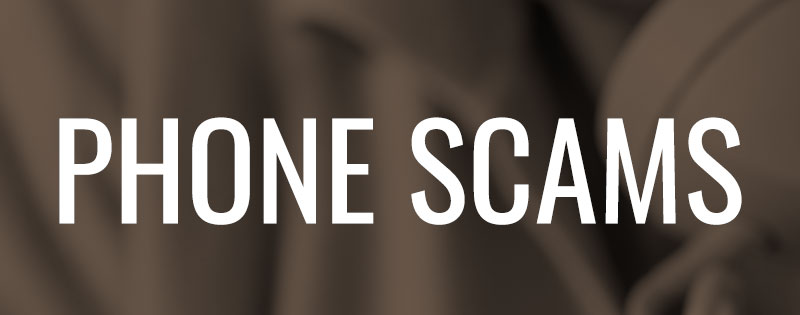

Telemarketing Fraud
When you send money to people you do not know personally or give personal or financial information to unknown callers, you increase your chances of becoming a victim of telemarketing fraud.
Warning signs of scam callers – What a caller may tell you:
-
“You must act ‘now’ or the offer won’t be good.”
-
“You’ve won a ‘free’ gift, vacation, or prize.” But you have to pay for “postage and handling” or other charges.
-
“You must send money, give a credit card or bank account number, or have a check picked up by courier.” You may hear this before you have had a chance to consider the offer carefully.
-
“You don’t need to check out the company with anyone.” The callers say you do not need to speak to anyone including your family, lawyer, accountant, local Better Business Bureau, or consumer protection agency.
-
“You don’t need any written information about the company or their references.”
-
“You can’t afford to miss this ‘high-profit, no-risk’ offer.”

Tips for Avoiding Telemarketing Fraud:
Don’t buy from an unfamiliar company.
Legitimate businesses understand that you want more information about their company and are happy to comply.
Always check out unfamiliar companies.
Check out unfamiliar companies with your local consumer protection agency, Better Business Bureau, state attorney general, the National Fraud Information Center, or other watchdog groups.
Always ask for and wait until you receive written material about any offer or charity.
If you get brochures about costly investments, ask someone whose financial advice you trust to review them.
Obtain a salesperson's information.
Obtain a salesperson’s name, business identity, telephone number, street address, mailing address, and business license number before you transact business. Verify the accuracy of these.
Ask what percentage is paid in commission.
Before you give money to a charity or make an investment, find out what percentage is paid in commissions and what percentage actually goes to the charity or investment.
Ask about the guarantee.
Before you send money, ask yourself a simple question: “What guarantee do I really have that this solicitor will use my money in the manner we agreed upon?”
Don't pay the caller in advance.
Never pay in advance for services; pay only after they are delivered.
Be wary of companies that want to send a messenger to your home to collect money.
In reality, they are taking your money without leaving any trace of who they are or where they can be reached.
Never make a quick decision.
Always take your time making a decision. Legitimate companies won’t pressure you to make a snap decision.
Never pay for a “free prize.”
If a caller tells you the payment is for taxes, he or she is violating federal law.
Decide on your limits.
Before you receive your next sales pitch, decide what your limits are—the kinds of financial information you will and won’t give out on the telephone.
Talk with a trusted friend, family member, or financial advisor.
When it comes to large investments, it is never rude to wait and think about an offer.
Never give out personal information.
Never tell unfamiliar companies or unknown persons your credit card numbers and expiration dates, bank account numbers, dates of birth, or social security numbers.
If you've been victimized before, you can still be a target.
If you have been victimized once, be wary of persons who call offering to help you recover your losses for a fee paid in advance.
Report any scam or suspicious behavior.
If you have information about a fraud, report it to state, local, or federal law enforcement agencies.


